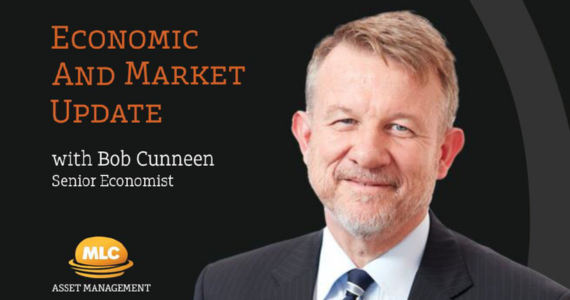Key events in April 2024
- Global shares fell in April given concerns over stubborn inflation pressures, diminishing hopes for interest rate cuts as well as the intensifying conflicts in the Middle East. In early April, both Iran and Israel launched selective military attacks on each other with an exchange of missiles and drones.
- Wall Street share prices slipped from their historic highs given persistent inflation and strong US economic activity data. US consumer inflation came in at 3.5% in the year to March which is the highest in the past six months. Strong US jobs gains and a rebound in retail spending in March also generated concerns that US interest rates are not likely to fall in coming months.
- Chinese shares made strong gains with more encouraging signs that economic activity is proving more resilient despite the property sector’s woes. However Japanese shares slipped back after the strong gains earlier this year with concerns that a weakening currency warrants higher interest rate settings in Japan.
- Australian shares also declined sharply given sticky inflation readings and fading hopes for interest rate cuts by the Reserve Bank of Australia (RBA) soon. The Real Estate Investment Trust and Consumer Discretionary sectors led the falls given their sensitivity to higher interest rates. There was also broad- based weakness across the industry sectors ranging from Consumer Staples to Information Technology in line with weakness across global share markets. The clear exception was the Resources sector which made a mild gain on hopes that an improving Chinese economy would boost iron ore and metal prices.
Asset class summary
Asset class returns in Australian dollars – periods to 30 April 2024.
| CYTD % | 1 month % | 3 months % | 1 year % | 3 years pa % | 5 years pa % | 10 years pa % | |
| Australian shares | 2.3 | -2.9 | 1.2 | 9.0 | 7.1 | 8.0 | 7.8 |
| Global shares (hedged) | 6.3 | -2.8 | 5.1 | 18.0 | 4.8 | 8.6 | 9.2 |
| Global shares (unhedged) | 9.9 | -2.8 | 5.9 | 19.5 | 10.5 | 11.2 | 12.1 |
| Emerging markets (unhedged) | 8.1 | 0.9 | 9.8 | 11.8 | -0.1 | 3.5 | 6.7 |
| Australian property securities | 7.3 | -7.6 | 6.0 | 18.9 | 7.5 | 5.5 | 9.3 |
| Global property securities (hedged) | -5.4 | -5.4 | -2.1 | -0.1 | -4.3 | –1.7 | 3.2 |
| Global listed infrastructure (hedged) | 1.7 | -0.8 | 3.6 | -0.8 | 1.4 | 2.6 | 6.3 |
| Australian bonds | -1.0 | -2.0 | -1.2 | -0.7 | -2.1 | –0.3 | 2.3 |
| Global bonds (hedged) | -2.0 | -1.7 | -1.7 | 0.4 | -3.0 | –0.5 | 2.1 |
| Global high yield bonds (hedged) | -0.2 | -1.0 | -0.1 | 6.2 | 0.0 | 2.4 | 4.0 |
| Australian inflation-linked bonds | -0.3 | -0.9 | -0.1 | 1.7 | 1.5 | 2.4 | 2.9 |
| Cash | 1.4 | 0.4 | 1.1 | 4.2 | 2.2 | 1.5 | 1.8 |
| AUD/USD | -4.8 | -0.5 | -1.8 | -1.7 | -5.6 | –1.6 | -3.5 |
Past performance is not a reliable indicator of future performance. Sources: Australian shares – S&P/ASX 300 Total Return Index; Global shares (hedged) – MSCI All Countries World (A$ hedged, Net); Global shares (unhedged) – MSCI All Countries World in A$ (Net); Emerging markets – MSCI Emerging Markets in A$ (Net); Australian property securities – S&P/ASX 300 A-REIT Accumulation Index; Global property securities – FTSE EPRA/NAREIT Developed (A$ hedged, Net); Global listed infrastructure – FTSE Global Core Infrastructure 50/50 (Hedged $A); Australian bonds – Bloomberg AusBond Composite 0+ Yr Index; Global bonds (A$ hedged) – Barclays Global Aggregate (A$ hedged, Gross); Global high yield bonds (A$ hedged) – Barclays US High Yield Ba/B Cash Pay x Financials ($A Hedged); Australian inflation-linked bonds – Bloomberg AusBond Inflation Government 0+ Yr Index; Cash – Bloomberg AusBond Bank Bill Index; AUD/USD – WM/Reuters Daily (4 pm GMT).
Key events in global markets over the last three months to April
Global shares have achieved very strong gains over recent months despite concerns over the conflicts in the Middle East and Ukraine. Optimism on ‘Artificial Intelligence’ (AI) and hopes that central banks would consider reducing interest rates have driven share prices higher. Global shares (unhedged) recorded a very strong 5.9% return for the past three months. The fall in the Australian dollar has also boosted global shares (unhedged) returns. Hedged global shares delivered a strong 5.1% return for the last 3 months.
Wall Street’s benchmark S&P 500 Index delivered a strong 4.2% quarterly return in local currency terms with the exuberant optimism on AI and technology shares.
European shares have also delivered strong gains in local currency terms. While the continuing Russia-Ukraine war is a major concern, investors have taken solace in milder inflation and the prospect for lower interest rates.
Asian share markets have delivered strong performances. Chinese share markets have made a welcome recovery (MSCI 16.9% return, in local currency) with hopes that the financial stress in the property sector is starting to stabilise. Japan’s Nikkei 225 Index also delivered a strong quarterly return with the central bank’s assurance that interest rates would remain low.
Global bonds (hedged) delivered a weak -1.7% quarterly return. Bond investors have become more cautious on global inflation prospects and whether central banks will readily cut interest rates this year.
Global high yield bonds (hedged) have made a flat return for the quarter as investors viewed that high yield is attractive from an income perspective but persistent inflation is still a major concern.
Key events in Australia over the last three months to April
Australian shares delivered a mild quarterly return of 1.2%. There were remarkable gains for the Information Technology (18.1%) sector on ‘AI’ optimism. The Utilities sector’s exceptionally strong 10% return is a recovery after weak performance last year. Solid share gains for the Financial sector of 3% were also made with expectations that interest rates have peaked. Yet there were some major disappointments. The Consumer Staples and Energy sectors both made a -5.1% return given a cautious assessment on prospects.
Australia’s economy is displaying significant slowdown signs with weak consumer spending and housing construction. The impact of higher goods and services prices, rising mortgage interest rates and rents continue to squeeze household budgets. There is concern that inflation is now proving sticky and stubborn (March 3.6% annual increase) which could see the RBA maintain interest rates at current high levels.
Global prospects
Global share prices have made remarkable gains this year. The enthusiasm for AI and technology have been key contributors. There is also confidence that the inflation threat is fading which could lead to lower interest rates in 2024. However, these exuberant expectations may not be delivered if inflation proves more persistent and central bankers more stubborn in lowering interest rates. The continued tragic Russian-Ukraine War and Hamas-Israel conflict are also key threats to global economic stability and investor sentiment. National elections in India, Mexico, Britain and the US this year are also political risks to contend with.
Accordingly, there are significant inflation, interest rate and political risks that investors should be cautious on. Assessing these complex risks is very challenging. As there are multiple positive and negative outcomes possible this year, investors should maintain a disciplined and diversified strategy.
Important information This communication is provided by MLC Investments Limited (ABN 30 002 641 661, AFSL 230705) (MLC), part of the Insignia Financial Group of companies (comprising Insignia Financial Ltd, ABN 49 100 103 722 and its related bodies corporate) (‘Insignia Financial Group’). An investment with MLC does not represent a deposit or liability of, and is not guaranteed by, the Insignia Financial Group. This information may constitute general advice. It has been prepared without taking account of an investor’s objectives, financial situation or needs and because of that an investor should, before acting on the advice, consider the appropriateness of the advice having regard to their personal objectives, financial situation and needs. Past performance is not a reliable indicator of future performance. Share market returns are all in local currency. Any opinions expressed in this communication constitute our judgement at the time of issue and are subject to change. We believe that the information contained in this communication is correct and that any estimates, opinions, conclusions or recommendations are held or made as at the time of compilation. However, no warranty is made as to their accuracy or reliability (which may change without notice), or other information contained in this communication. This information is directed to and prepared for Australian residents only. MLC may use the services of any member of the Insignia Financial Group where it makes good business sense to do so and will benefit customers. Amounts paid for these services are always negotiated on an arm’s length basis. MLC relies on third parties to provide certain information and is not responsible for its accuracy, nor is MLC liable for any loss arising from a person relying on information provided by third parties. Bloomberg Finance L.P. and its affiliates (collectively, “Bloomberg”) do not approve or endorse any information included in this material and disclaim all liability for any loss or damage of any kind arising out of the use of all or any part of this material. The funds referred to herein is not sponsored, endorsed, or promoted by MSCI, and MSCI bears no liability with respect to any such funds.


